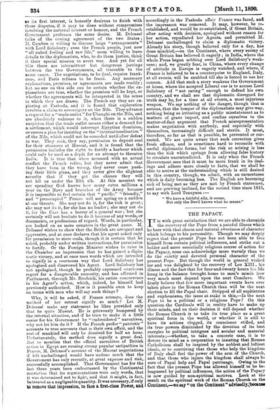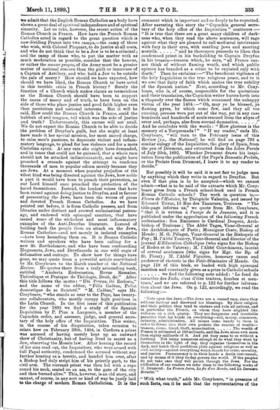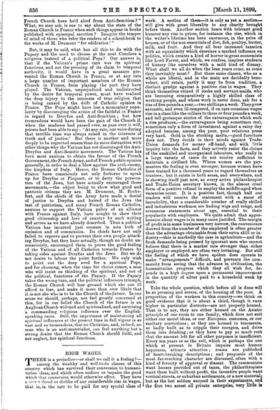THE PAPACY.
IT is with great satisfaction that we are able to chronicle the recovery of the Pope from a painful illness which he bore with that charm and natural sweetness of character which belongs to his personality. Though we may deeply regret that the present Pope has not been able to free himself from certain political influences, and strike out a bolder and more essentially religious course of action for the Papacy, none can acknowledge more warmly than we do the saintly and devoted personal character of the present Pope. But though the world in general wished for and was delighted by the recovery of Leo XIII , his illness and the fact that for four-and-twenty hours his life hung in the balance brought home to men's minds how very much must depend upon the next Conclave. We firmly believe that few more important events have ever taken place in the Roman Church than will be the next election to fill the Papal chair. Stripped of all sophistries and euphemisms, the issue at stake is this,—Is the next Pope to be a political or a religious Pope ? On this question the Cardinals will in reality have to make up their minds, and on their decision it will depend whether the Roman Church is to take its true place as a. great spiritual force in the world, or whether it is still to have its actions clogged, its conscience stifled, and its true powers diminished by the devotion of its best energies to political intrigues and secular and material interests ;—whether, to take a concrete case, it is to devote its mind as a corporation to insisting that Roman Catholicism shall be inspired by the noblest and loftiest ideals or to contriving that those who help the kingdom of Italy shall feel the power of the arm of the Church, and that those who injure the kingdom shall always be sure of Papal help and Papal patronage. Owing to the fact that the present Pope has allowed himself to be be- leaguered by political influences, the action of the Papacy is now guided by non-spiritual motives. Look at the result on the spiritual work of the Boman Church on the Continent—we say "on the Continent " advisedly,;beeauee we admit that the English Roman Catholics as a body have shown a great deal of spiritual independence and of spiritual sincerity. Let us take, however, the recent action of the Roman Church in France. How have the French Roman Catholics acted in regard to the great question which is now dividing France into two camps,—the camp of those who wish, with Colonel Picquart, to do justice at all costs, and who do not think that to be a Jew is to be a criminal ; and the camp of those who, to put the matter with as much moderation as possible, consider that the honour, or rather the amour propre, of the Army must be a greater matter of national concern than the guilt or innocence of a Captain of Artillery, and who hold a Jew to be outside the pale of mercy? How should we have expected, how should we have liked, the Roman Church to have acted in this terrible crisis in French history ? Surely the function of a Church which makes claims so tremendous as the Roman Church should have been to support the cause of mercy and of truth, to have been on the side of those who place justice and good faith higher even than patriotism and national interests. But it will be said, How could the Roman Church in France, amid the hubbub of evil tongues, tell which was the side of justice and truth ? Unfortunately, this excuse will not avail. We do not expect the Roman Church to be able to decide the problem of Dreyfus's guilt, but she might at least have made it her special mission, her most sacred charge, to calm men's passions, to deprecate violent and inflam- matory language, to plead for less violence and for a more Christian spirit. At any rate she might have demanded, and in tones that could not be gainsaid, that a whole race should not be attacked indiscriminately, and might have preached a crusade against the attempt to condemn thousands of men to popular odium merely because they are Jews. At a moment. when popular prejudice of the vilest kind was being directed against the Jews, how noble a part it would have been to preach their protection, as our Lord himself once preached the protection of the hated Samaritans. Instead, the loudest voices that have been raised against doing justice to Dreyfus, and in favour of persecuting the Jews, have been the voices of pious and devoted French Roman Catholics. As we have pointed out before, it is from Catholic presses, and from libraries under distinct and avowed ecclesiastical patron- age, and endowed with episcopal sanction, that have issued some of the wickedest and most inflammatory examples of the Anti-Dreyfus literature. Instead of holding back the people from an attack on the Jews, Roman Catholics—and not merely in isolated examples —have been hounding them on. It is Roman Catholic writers and speakers who have been calling for a new St. Bartholomew, and who have been confounding Huguenots, Jews, and Dreyfusards in one wild orgie of defamation and outrage. To show how far things have gone. we may quote from a powerful article contributed by Mr. Conybeare to the March number of the National Review. He quotes there from a, truly astounding book, entitled " Analecta Ecclesiastica, Revue Romaine, Theoretique et Pratique de Theologie, Droit, etc." After this title follows the motto:- " Ubi Petrus, ibi Ecclesia," and the name of the editor, "Felix Cadene, Praia domestique de sa Saintete." "M. Cadene," says Mr. Conybeare, "who stands so near to the Pope, has twenty- one collaborators, who mostly occupy high positions in the Latin Church. In the first issue of this publication for the year 1895 we find a study of the Spanish Inquisition by P. Pius a Langonio, a member of the Capuchin order, and assessor, judge, and general secre- tary of the holy office of the Inquisition. This writer, in the course of his disquisition, takes occasion to relate how on February 28th, 1444, in Cordova a priest was accused of having merely kept up an outward show of Christianity, but of having lived in secret as a Jew, observing the Mosaic law. After hearing the record of his sins read out, the Inquisitors, who were armed with full Papal authority, condemned the accused without any farther hearing as a heretic, and handed him over, after a Bishop had duly stript him of his priestly garb, to the civil arm. The recreant priest was then led with a rope round his neck, seated on an ass, to the gate of the city and then burned alive." This, however, is an old story, and cannot, of course, in any sort or kind of way be justly laid to the charge of modern Roman Oatholicism. It is the comment which is important and so deeply to be regretted. After narrating this story the "Capuchin general secre- tary of the holy office of the Inquisition" continues :— " It is true that there are a great many children of dark- ness who, when they read the above sentences, will rage against what they are pleased to call media3val intolerance with fury in their eyes, with snarling jaws and snorting nostrils "and he thereupon proceeds to liken this condemned priest in his backsliding to Captain Dreyfus in his treason—treason which, he says, "all France can- not think of without flaming wrath, and which public opinion has branded as a crime to be expiated only with death." Then he exclaims :—" The beneficent vigilance of the holy Inquisition is the true religious peace, and to it we owe that fixity of faith which makes the true nobility of the Spanish nation." Next, according to Mr. Cony- beare, who is, of course, responsible for the quotations and their translation, the Capuchin writer bursts forth into a, rhapsody over the flames which consumed the unhappy victim of the year 1404:—" Oh, may ye be blessed, ye flaming pyres, by which some few, and they all too cunning, persons were put out of the way, yet in any case hundreds and hundreds of souls rescued from the abyss of error and, perhaps, also from eternal damnation And he concludes with the words : "How glorious is the memory of a Torquemaola ! " "If my reader," ends Mr. Conybeare, "will turn to the February issue of this Review [i.e., the National] he will find on page 793 a. similar eulogy of the Inquisition, the glory of Spain, from the pen of Drumont, and extracted from the Libre Parole of July 20th, 1892. Whether Drumont draws his inspi- ration from the publication of the Pope's Domestic Prelate, or the Prelate from Dramont, I leave it to my reader to decide."
But possibly it will be said it is not fair to judge men by anything which they write in regard to Dreyfus. But even if that plea is to be accepted—which we cannot admit—what is to be said of the extracts which Mr. Cony- beare gives from a French school-book used in French Roman Catholic schools ? The work in question is,— Fleur* de rHistoire, by Theophile Valentin' and issued by Edouard Trivat, 15 Rue des Tanneurs, Toulouse. "The title-page informs us," we quote from Mr. Conybeare, "that it is written a rusage de la Jewnesse, and it is published under the approbation of the following French ecclesiastics : Son Eminence le Cardinal Desprez, Arch- bishop of Toulouse • The Abbe Tages, Vicar-General at the Archbishopric of Paris ; Monsignor Coate, Bishop of Mende ; M. G. Pelagot, Vicar-General in the Bishopric of Puy ; M. l'Abbe Touzery, Vicar-General and director of the journal L'Education Catholique (who signs for the Bishop of Rodez et de Vabres) ; M. l'Abbe Courchinoux, laureat of several academies (who signs for Mgr. the Bp. of St. Flour) ; M. l'Abbe Figuiere, honorary canon and professor of rhetoric in the Petit-Seminaire of Mende. On page 118 of this book, so loaded with high episcopal sanction and constantly given as a prize in Catholic schools we find the following note added : Le fond du caractere des Juifs, c'est d'être traitres, fourbes et men- teurs,' and we are referred to p. 122 for further informa- tion about the Jews. On p. 122, accordingly, we read the following Note upon the Jews.—The Jews are a mined race, since they sold our Saviour and disowned his blessings. By their religion and their politics they tend to enslave and ruin all nations, and in particular the French, on whom they have alighted like vultures on a rich quarry. They are dangerous and insatiable parasites that lay hands on everything—soil, money, commerce, industry, administration. All means come handy to them in order to divert into their own pockets the sources of wealth— treason, crime, fraud, theft, assassination The wealth of France is estimated at 150 milliards, and the Jews alone own more than eighty milliards of it. And yet they came to us without a farthing Not being numerous enough to do what they want by themselves in the light of day, they organise themselves in the dark, and hatch their perfidious plots against religious as well as civil society—against everything which stands for order, morality, and justice. Freemasonry is in their hands a docile instrument, and by means of it they to-day govern the world. If the peoples do not take care they will perish through the Jews. For the edification of our readers we refer them to the following works of M. Drumont: La Prance Juive, La fin d'un Monde, and La Dsraiirs Bataale.' " "With what truth," adds Mr. Conybeare, "in presence of snob facto, can it be said that the representatives of the French Church have held aloof from Anti-Semitism ? " What, we may ask, is one to say about the state of the Roman Church in France when such things appear in books published with episcopal sanction ? Imagine the temper of mind of those who refer the readers of a school-book to the works of M. Drumont "for edification!"
But, it may be said, what has all this to do with the Papacy and the need to choose at the next Conclave a religious instead of a political Pope ? Our answer is, that if the Vatican's prime care was its spiritual functions, and not the pressing of its claim to temporal authority, it would have in a great measure pre- vented the Roman Church in France, or at any rate a large number of important members of the Roman Church in France, from playing the part they have played. The Vatican, unprejudiced and undistracted by the desire for temporal power, must have realised the deep injury to the interests of true religion that is being caused by the drift of Catholic opinion in France. The Pope might have lost a momentary popu- larity by discouraging the action of the faithful in France in regard to Dreyfus and Anti-Semitism ; but how tremendous would have been the gain of the Church if, when the madness had passed over, as pass over it will, priests had been able to say : At any rate, our voice during that terrible time was always raised in the interests of truth and of justice.' But there is another and more deeply to be regretted reason than its mere distraction with other things why the Vatican has not discouraged the Anti- Dreyfus and Anti-Semitic movements. The Vatican has been most anxious to obtain the favour of the French Government, the French Army, and of French public opinion generally, in order to deal a blow against the arch-enemy, the kingdom of Italy. Hence, the Roman Catholics of France have consciously not only forborne to speak up for Dreyfus or Picquart, or to decry the persecu- tion of the Jews, but have actually encouraged those movements,—the object being to show what good and patriotic citizens they are. M. Drumont, M. Roche- fort, and the chiefs of the Army have made a denial of justice to Dreyfus and hatred of the Jews the test of patriotism, and many French Roman Catholics, anxious to support the Vatican policy of an alliance with France against Italy, have sought to show their good citizenship and love of country by such writing and action as we have already described. Thus a political Vatican has incurred just censure in acts both of omission and of commission. Its chiefs have not only failed to reprove and to prevent their own people attack- ing Dreyfus, but they have actually, though no doubt un- consciously, encouraged them to prove the good feeling of the Vatican and of all Catholics towards France by taking sides against Dreyfus and the Jews. But we do not desire to labour the point further. We only wish to point out the deep need for a spiritual Pope, and for choosing, when the time for choice comes, a man who will insist on thinking of the spiritual, and not of the political, functions of the Papacy. If the Papacy takes the wrong turn, and the political influences triumph, the Roman Church will lose ground which she can ill afford to lose, and make it more than ever likely that it is not she who is to be the Church of the future. In one sense we should, perhaps, not feel greatly concerned at this, for in our belief the Church of the future is an Anglican Church widened and spiritualised, and exercising a commanding religious influence over the English- speaking races. Still, the importance of maintaining all spiritual influences at the present time in full vigour is so vast and so tremendous, that no Christian, and, indeed, no man who is an anti-materialist, can feel anything but a strong desire that the Roman Church should fulfil, and not neglect, her spiritual functions.








































 Previous page
Previous page